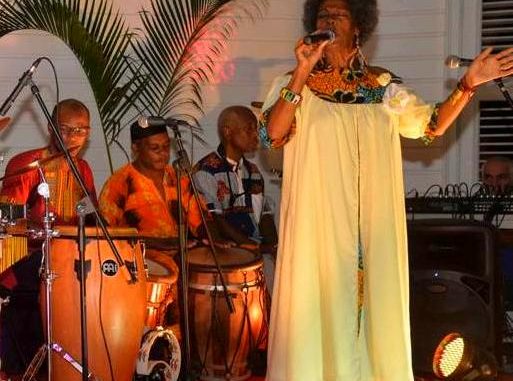
Cultural activist Marie-Line Dahomay, who was forced to cancel her performances because of the Covid-19 pandemic, invites to commemorate the abolition of slavery with two tracks she composed fifteen years ago, “San Rètou” and “Kalkil Mantal”, available on Youtube.

Last year, in May, we presented the very rich artistic career of the former nurse, cultural project manager and traditional music collector at the Médiathèque Caraïbe in Basse-Terre since 2005, gwoka singer and researcher in gwoka, Marie-Line Dahomay.
As we know, the month of May is called the month of the commemoration of the abolition of slavery, in particular in Martinique (May 22, 1948), Guadeloupe (May 27, 1948), St. Martin (May 28, 1848) and since 2006 in France, May 10 is the “National Day of Remembrance of the Slave Trade, Slavery and their Abolition”.
It is therefore natural to find the singer in the news at this time of year, since she campaigns so that this date in Guadeloupe (as well as others) is never forgotten by adults, but especially by the young generation often lacking reference points or in search of identity, and it is an opportunity to always celebrate our ancestors who were victims of this crime against humanity.
Because of the Covid-19 epidemic, all the shows planned by the artist – including “Longan”, a musical concept launched in 2018 to pay tribute to slaves and relieve our “blès” (pain) – had to be cancelled.
Calculating and repairing
However, Marie-Line Dahomay comes to remind us that there are two songs and two video clips to celebrate this historic date: “Kalkil Mantal” and “San Rètou”.
On May 10, 2019, together with her son Cyril d’Alexis who is an arranger, the singer released a new version of “Kalkil Mantal” she had composed in 2005 and she also took the opportunity to shoot its video in collaboration with Zandoliwood. Recall that in 2014, the Comité International des Peuples Noirs (International Committee of Black Peoples – C.I.P.N.), which also advocates for the rehabilitation of the enslaved African ancestor (Afrès), had recorded this song and presented it as an anthem for reparations (Im a Réparasyon, in Creole).
Why “Kalkil Mantal” (Mental Calculation)? Probably because throughout the song, the artist wonders about the number of men, women and children who were victims of slavery, the number of days they worked, the number of months they suffered, the number of years and centuries they were whipped for sugar cane, but she also asks how much money the slaveholders earned, how many boats they bought, how many women they raped, how many children were born without a father, how many pints of blood, sweat, tears and pain. Poignant lyrics in Creole for Guadeloupe and all the other Caribbean islands.
Returning and testifying
“San Rètou” (No Return) was also released in 2005 although it is less known, the accompanying video was made in 2017 by Passerel Pro. This song describes the state of “stripping” in which these men and women who boarded the slave ships, never to see the African continent again : “San Rètou, mwen san papa mwen pani non, San Rètou, mwen san manman mwen san nasyon, San Rètou, mwen ka chèché gadé dèyè, on chenn ka ralé mwen douvan, di mwen pouki” (No Return, I have no father, I have no name, No Return, I have no mother, I have no nation, No Return, I try to look back, a chain pulls me forward, tell me why), the artist sings.
In 2017, Marie-Line Dahomay returned to the African continent for all those ancestors who never saw their homeland again. She fulfilled her dream of returning to Benin where she met members of her family. In 2019, the cultural activist accompanied Guadeloupean schoolchildren on an educational trip to Ouidah, organized by the association “Génération Ti Moun TMA”.
Before the global coronavirus pandemic, a project entitled “Rencontre du Troisième Type” (Close Encounters of the Third Kind) with the discovery of African and Guadeloupean traditions, in particular through a tour and an artistic residency, was to carry out between 2020 and 2021, following a musical meeting with the singers of the band “Tériba” .








